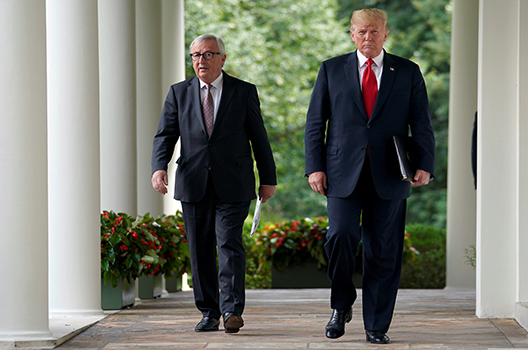
EU officials temper exuberant expectations of transatlantic truce
“European Union representatives told me that they would start buying soybeans from our great farmers immediately. Also, they will be buying vast amounts of LNG!”
That’s what US President Donald J. Trump tweeted after his meeting with European Commission President Jean-Claude Juncker at the White House on July 25, which both leaders praised as a successful de-escalation of tensions that were threatening to turn from a trade skirmish into an all-out war. Trump imposed tariffs of 25 percent on European steel imports and 10 percent on aluminum June 1 and has repeatedly threatened to hike taxes on European cars, which would have been disastrous for Germany.
Add that to Trump’s two-week stint disparaging the European Union (EU), ranging from describing Germany as “captive” to Russian gas to the bloc at large as Juncker had little to lose in accepting Trump’s invitation for last-ditch talks. But did he actually gain anything? Or give anything away?
An EU official present at the talks insisted the agreements made at the meeting do represent a significant step. Though expectations had been low, said the official, who briefed anonymously due to the sensitive nature of the information, he asserted the aversion—even if temporary—of a potential trade war is an outcome “of key importance” in its own right. Both sides agree to hold off on any further measures as long as the soon-to-be-appointed joint committee is discussing how to resolve the problems. A first assessment is due within 120 days of the group’s creation—landing after US midterm elections in November.
In addition, the EU briefer emphasized, this was the first time Trump has formally agreed on the need to reform the World Trade Organization (WTO), a body he often rejects wholesale along with other multilateral institutions. He noted Juncker had received the same signal from Beijing, creating a “triangle” of key players with the EU acting as facilitator, a role it relishes.
Yet at the same time, some observers felt Juncker squandered an opportunity to get steel tariffs lifted while Trump was under domestic pressure to reach a compromise. Dutch member of the European Parliament Marietje Schaake is among that group. “Remember for a month we’ve heard ‘the EU will not negotiate with a proverbial gun to its head, we will not negotiate under pressure,’” Schaake reminded. “To be frank, the image now emerges that the EU has negotiated under pressure, the pressure of more tariffs, this time on cars, and that it has conceded a number of things in order to get rid of this threat.”
Schaake said Juncker should have stuck to the demand “to get rid of the steel and aluminum tariffs first before we would have talked about anything else.” She underscored that “we really have to continue to send a clear signal, united as Europeans, that we don’t accept this kind of pressure in an alliance that we both built.”
But what may appear—and be portrayed in Washington—as concessions from Brussels might turn out to be less so, according to EU clarifications on points Trump declared to his advantage.
The official flatly rejected US Commerce Secretary Wilbur Ross’ assertion in a Fox News interview that the new talks will cover “all agricultural products.”
“Mr. Ross can say what he likes,” the official said emphatically. “Agriculture is not part of the scope of this agreement.”
Soybeans are the only exception. Promising to buy more US soy isn’t a sacrifice, he explained, as US prices are lower than its two competitors, Brazil and Argentina, due to an oversupply caused by sanctions China imposed on the United States in reaction to Trump’s tariffs. But should this not be the case, the official said, the EU isn’t bound to buy American. “We’re not going to turn into a Soviet-style economy,” he laughed. “Market rules remain in place. We are not going to import more than we need.”
Potentially increased imports of US liquefied natural gas (LNG) will follow the same market-based principles, he said. There are already preparations underway for specialized LNG terminals and transport ships on both sides of the Atlantic, as part of the EU’s longstanding energy diversification efforts. But he pointed out that, in addition to pricing, this also depends on the United States being willing to issue automatic export licenses for LNG shipments to Europe, otherwise the risk of disruption will affect the attractiveness of this option. To sum up, he said, the joint declaration says the EU “wants” to import more, not that it must. “It’s a declaration of intention,” he said.
And the question of intentions runs through the entire deal. How can Europe trust that a new tweet won’t show up next week that blanks out the one Trump issued of himself and Juncker embracing, showing — in the president’s words — that the US and EU now “love each other”?
Trust will be essential for successful negotiations, the EU official admitted, adding “we’ll see” how it goes with the White House. “We should not be triumphalist,” he concluded, “but this is the best result we could have expected.”
Schaake isn’t discounting the entire exercise, appreciating the change in tone from Trump. The problem remains, she lamented, “that we don’t know whether he will still agree with himself tomorrow!”
Teri Schultz is a freelance journalist based in Brussels. Follow her on Twitter @terischultz.
Image: U.S. President Donald Trump and President of the European Commission Jean-Claude Juncker walk together before speaking about trade relations in the Rose Garden of the White House in Washington, U.S., July 25, 2018. (REUTERS/Joshua Roberts)
